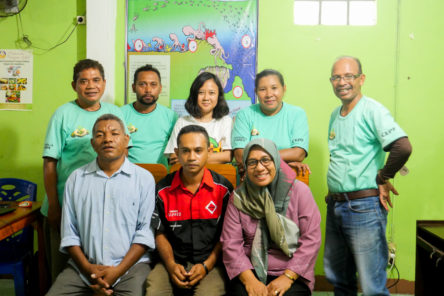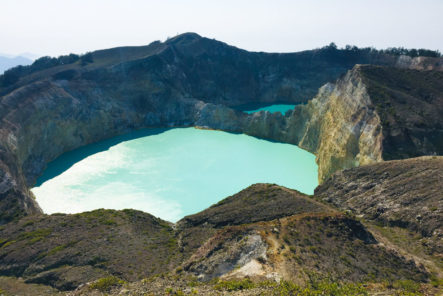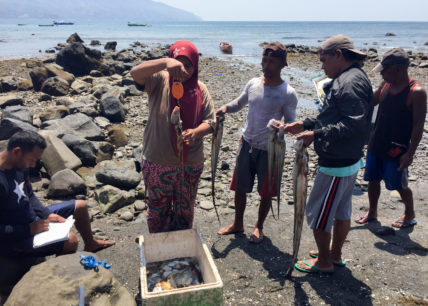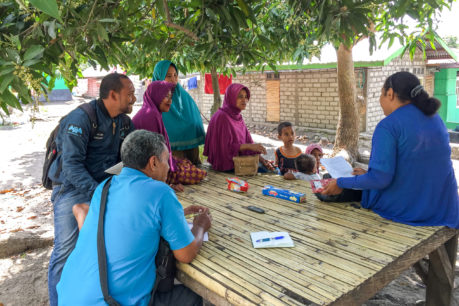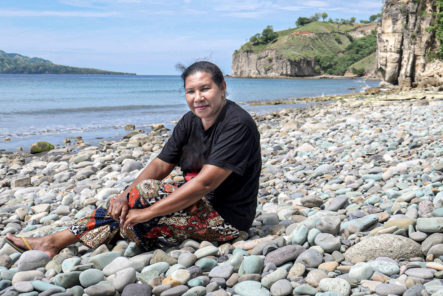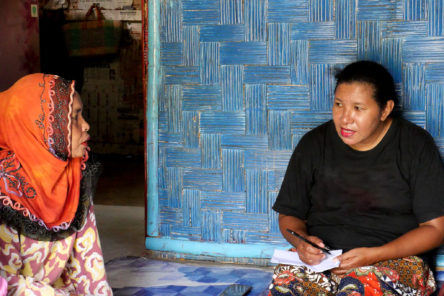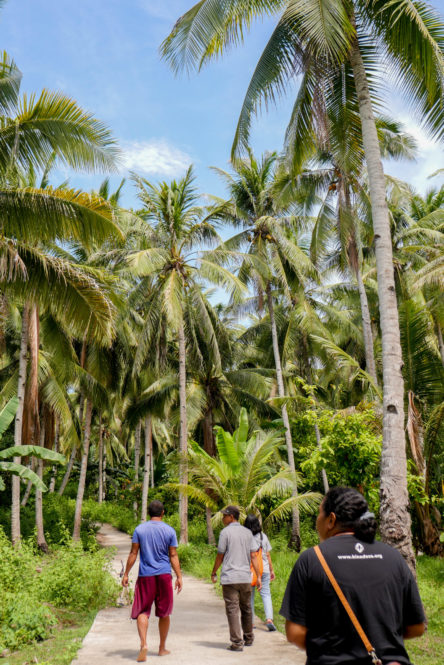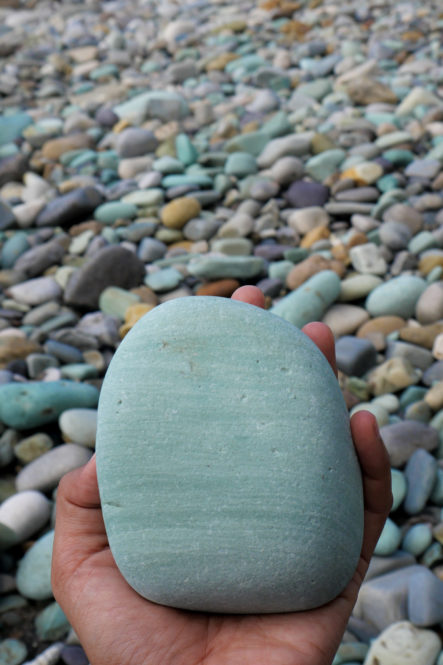This post is also available in:
 Indonesian
Indonesian
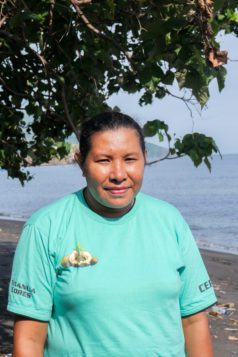
Metty Wasa of Tananua Foundation | Photo: Nisa Syahidah
This is the sixth blog in our Women in Fisheries series.
On Mourangga beach, the wind gently blows in from the sea as Metty and I sit chatting on the turquoise rocks that litter the shoreline. The coastal scenery here is captivating and rich in colour, but as Metty tells me about her journey from the mountains to the sea, it is her story that captivates me most.
Metty Wasa, is the Office Manager of Tananua Flores Foundation, a non-governmental organisation (NGO) that assists communities to improve their welfare and enhance biodiversity conservation in Ende Regency, East Nusa Tenggara, Indonesia. Since its establishment in 1989, Tananua has been supporting farming communities in the region, from teaching them how to plant crops to establishing effective cooperatives. Metty has spent 25 years working with Tananua, developing its three main programmes – sustainable farming, basic health, and people’s economy.
Up until May 2019, the organisation’s main objective was to improve the lives of farmers, working high up in the mountains of the region. But last year, in partnership with Blue Ventures, Tananua ventured down from the highlands and headed towards the sea. They started assisting the octopus fishers from Mourongga Village and Tentadara Village – both in South Ende – to monitor their octopus catches.
Like many small-scale fisheries, a lack of data has been a chronic problem in these coastal villages. By gathering data with support from Tananua, the communities will now be able to understand their fishery potential and begin discussing ways to sustainably manage their natural marine resources.
Meet Metty Wasa
As Metty and I talk, the sound of rippling waves sings softly in the background. The location is truly idyllic – it’s easy to understand why Metty was drawn to the coast.
“As I remember, I could not see the ocean from my house, the shoreline was far below. But now, I can see it clearly right from where I live. So over the years, I have seen the sea level rising. The ocean is changing and now there are less fish. Yet, fishers here seem to be unaware that one day all the fish will be gone, they believe that there will always be fish in the ocean,” said Metty.
Metty was born into a farming family in Nduria Village, at the foothills of Mount Kelimutu National Park, a volcano famous for its three vibrant acid crater lakes. During high school, Metty moved to Ende, experiencing city life for the first time. It was here that she started her 25 year journey with Tananua Foundation and found her passion for community empowerment work.
“Back then, I didn’t have the privilege to go to college. After my dad died during my first year in high school, my mother single-handedly raised us and sent all of us to school,” said Metty. “So, instead of going to college, I took a typing course and applied for a field assistant job at Tananua,” she added.
Upon starting her new role at Tananua, Metty had to learn everything from scratch. “For my first three months, I spent most of my time learning about farming and community development work,” she said.
Metty’s passion for the cause meant that she quickly flourished in her role, spending 12 years as a field assistant. Metty’s expertise grew as she worked her way up through the organisation, briefly working as supervisor for the health programmes before finally settling in her current role as Tananua’s Office Manager and Secretary. Now, Metty is responsible for managing the organisation’s administration, partnership, capacity building, and staff development.
“I don’t have a higher education, but what I have always had is high motivation to learn,” she said. “I don’t have a degree in agriculture, nor economics, but a degree in Tananua,” she laughed. Over the last two decades, Metty has devoted her life to Tananua, assisting 90 villages across 11 sub districts in Ende Regency.
Empowering communities from the land to the sea
I am intrigued to learn more about how a foundation working with farmers in the mountains came to turn their hand to small-scale fisheries. I ask Metty to continue her story about her recent work with the local fishing communities in South Ende.
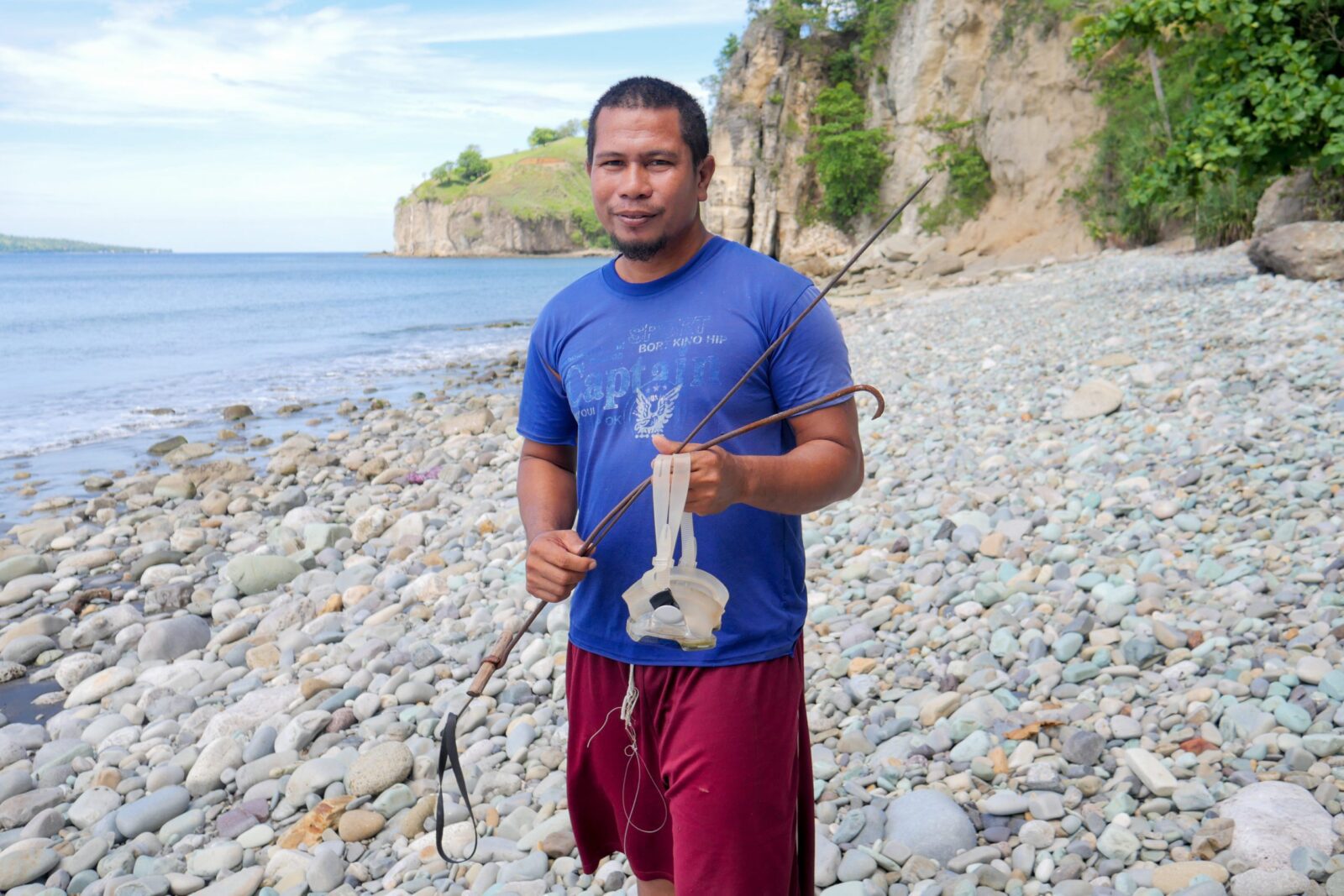
An octopus fisher from Mourongga showing his fishing gear | Photo: Nisa Syahidah
Metty told me that after the fishers agreed that they wanted to learn more about their octopus resources, Tananua began to teach them how to collect and record catch data. This participatory approach to fisheries monitoring can provide fishers with meaningful opportunities to understand and participate in fisheries management.
To complement the process, Metty and her team lead data feedback sessions on the collected octopus fishery data with both villages. She has already noticed small but important changes amongst the fishers.
“The community began to recognise the significance of protecting coral reefs as the fish habitat, understanding that ocean resources would soon be depleted if they take the marine environment for granted,” she explained happily. “Now, people in the villages can start to share this crucial knowledge with fellow fishers, their families and even their neighbours!”
Metty explained that although the contexts are different, herself and her team at Tananua work in similar ways with both fishers and farmers:
We encourage fishers to start thinking far ahead, because just like farmers, safeguarding their environment and resources now means securing their livelihoods for generations to come.”
Bridging the mountains and the sea
The sea and the mountains are interconnected, it is an inseparable unity,” said Metty.
Her philosophy mirrors the Balinese concept of ‘Nyegara Gunung’ – Segara meaning the seas, and Gunung meaning the mountains – which considers the mountains and the seas as one and integral. Therefore, every action on the mountain will have an impact on the sea, and vice versa.
“It signifies how important it is to preserve the synergy between the sea and the mountains, harmonising the upstream and downstream,” Metty added. “If the people in the mountains treat the seas as landfill sites, they will suffer the consequences when ocean ecosystems collapse.”
This ethos lies at the heart of Tananua’s work. Every six months, Tananua coordinates a meeting for farmers and fishers, building harmony between the mountains and the sea.
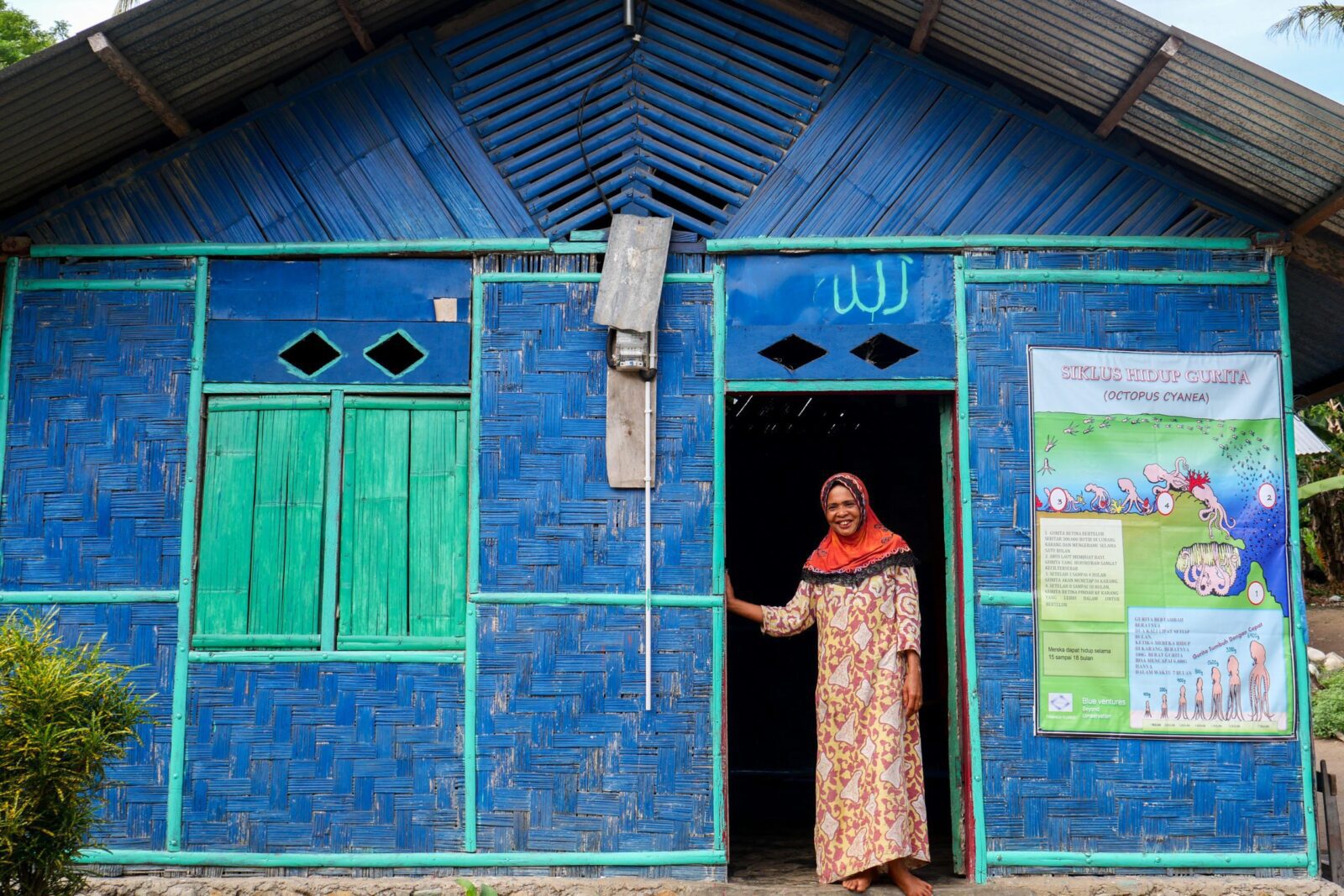
An octopus fishers house in Mourongga | Photo: Nisa Syahidah
Imran is an octopus fisher from Mourangga Village. He recalls his experience about the meeting as we enjoy some freshly picked coconut from his garden. “I told the farmers about the life of an octopus fisher and also about the sea bed and corals that have been engulfed by plastic waste,” said Imran, “The farmers are beginning to understand that the disposal of waste in waterways is detrimental to other people’s livelihoods.” he concluded.
By having both fishers and farmers in a gathering, they can learn about each other’s professions, understand how their lives cross paths, and appreciate each other’s hard work.” Metty explained.
Metty has a dream of leading a programme on the sustainable use of oceans and mountain resources that so many of the communities in this region rely on.
“Those who sow will reap”
Back on the turquoise rocks, we watch the waves gently lap against the shore, and Metty shares something that she has learnt over the years, which she holds close to her heart: “Those who sow will reap. If we don’t sow, there will be nothing to reap.”
Metty is reaping the fruits of success after years of sowing the seeds of hard work, discipline, and progressive learning. Yet, behind her accomplishments at Tananua, there is more to her than meets the eye; Metty is also a devoted wife and mother of four children.
Since she was a child, Metty has been raised to be independent. As the oldest child with seven younger siblings, she learned about discipline, “I was raised by a strong woman, so being weak has never been an option,” she exclaimed.
Metty continues to share her perspective of the challenges that women face, “Today, women are expected to work both inside and outside the home to ensure the economic security of their families, yet the traditional mindset of most men is that our only role is to do domestic chores. It is the inbred patriarchal nature of society that discriminates against women’s role,” she rebuked.
Despite the challenges, Metty wants to empower and support women’s involvement at the management level of cooperatives in the villages that Tananua works with,
Women should raise each other up to be heard and thrive.”
Metty’s determination, charisma and optimism shines through as she tells her story. Her maternal instinct and motivation to change women’s futures for the better is truly inspiring; for me, for her daughter, for her female colleagues at Tananua, and for the women in the communities to whom she has dedicated 25 years of her life.
Read more from our Women in Fisheries series:
Locally led conservation: listening, persevering and working together
Building confidence through communication: an interview with Mursiati of FORKANI


